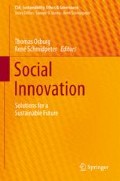Abstract
Social innovation has attracted much recent attention from academics, policy makers and practitioners during the past 10 years, although examples of social innovation can be traced far back to the early nineteenth century, see for example the pioneering reformer Robert Owen at the New Lanark Woolen Mill (Owen http://www.robert-owen.com/, 2012). The main argument about social innovation is that it has the potential to effect change in conventional sectors of the economy and society. These sectors include government and the public sector, not-for-profits, as well as the for-profit sector. Social innovation can also include more loosely organized actors within a community or engaged in a community venture. At the same time, by its very nature, social innovation does not conform to the neat boxes of sectors instead it often intersects and overlaps sectors. This chapter focuses on the link between sustainable development and social innovation. It takes the position that the call for sustainable development is the greatest challenge to humanity of our time.
Access this chapter
Tax calculation will be finalised at checkout
Purchases are for personal use only
References
Ackoff R (1974) Re-defining the future. Wiley, London
Ashby WR (1962) Principles of the self-organizing system. In: Von Foerster H, Zopf GW Jr (eds) Principles of self-organization: transactions of the University of Illinois symposium. Pergamon Press, London, pp 255–278
Beer LS (1972) Brain of the firm. Allen Lane/The Penguin Press, London
Beer LS (1984) The viable system model: its provenance, development, methodology and pathology. J Oper Res Soc 35(1):7–25
Boulding K (1966) The economics of the coming spaceship earth. In: Jarrett H (ed) Environmental quality in a growing economy. Resources for the Future/Johns Hopkins University Press, Baltimore, pp 3–14
Brundtland G-H (1987) Our common future, report of the United Nations commission on environment and development. Oxford University Press, Oxford
Chevalier M, Cartwright T (1966) Towards an action framework for the control of pollution. In: National conference on pollution and our environment. Canadian Council of Resource Ministers, Ottawa, paper D 30–1.Meta-problems
Crutzen PJ, Stoermer EF (2000) The anthropocene. Glob Change Newsl 41:17–18
Emery M, Purser RE (1996) The search conference: a powerful method for planning organizational change and community action. Jossey-Bass Public Administration, San Francisco
Emery F, Trist E (1973) Towards a social ecology: contextual appreciation of the future in the present. Plenum Press, New York
IUCN (1981) World conservation strategy. IUCN, Gland
Kuhn T (1970) The structure of scientific revolutions. Chicago University Press, London
Meadows D, Meadows D, Randers J, Behrens W (1972) Limits to growth. Universe Books, New York
Owen R (2012) http://www.robert-owen.com/. Accessed 10 October 2012
Rittel H, Webber M (1973) Dilemmas in a general theory of planning. Policy Sci 4:155–169
Roome N (2011) A retrospective on globalization and sustainable development: the business challenge of systems organization and systems integration. J Bus Prof Ethics 30(3&4):193–228
Skeffington (1969) Report on people and planning. HMSO, London
Trist E (1983) Referent organizations and the development of inter-organizational domains. Hum Relat 36(3):269–284
United Nations (1972) Report of the United Nations conference on human development. http://www.unep.org/Documents.Multilingual/Default.asp?DocumentID=97, 10 October 2012
United Nations (1992) Earth summit – Agenda 21, the United Nations programme of action from Rio. United Nations, New York
von Bertalanffy L (1968) General system theory: foundations, development, applications. George Braziller, New York
Author information
Authors and Affiliations
Corresponding author
Editor information
Editors and Affiliations
Rights and permissions
Copyright information
© 2013 Springer-Verlag Berlin Heidelberg
About this chapter
Cite this chapter
Roome, N.J. (2013). Sustainable Development: Social Innovation at the Interface of Business, Society and Ecology. In: Osburg, T., Schmidpeter, R. (eds) Social Innovation. CSR, Sustainability, Ethics & Governance. Springer, Berlin, Heidelberg. https://doi.org/10.1007/978-3-642-36540-9_27
Download citation
DOI: https://doi.org/10.1007/978-3-642-36540-9_27
Published:
Publisher Name: Springer, Berlin, Heidelberg
Print ISBN: 978-3-642-36539-3
Online ISBN: 978-3-642-36540-9
eBook Packages: Business and EconomicsBusiness and Management (R0)

